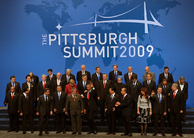|
Economics
Page 7/8 | Showing results 91 - 105 of 114
2011, Vol. 2011/2012 No. 1
The Economic Monetary Union (EMU) is the end point of an ambitious and historic stage of integrated market changes1 that not only challenge the structure and foundation of modern-day liberal capitalism, but also offer – where successful &ndash... Read Article »
2011, Vol. 4 No. 2
This essay seeks to elucidate the puzzle of China's policy decision to create a Sovereign Wealth Fund (SWF). Much literature has been put forth on the topic to predict the strategic benefits China may be pursuing through its investments in American... Read Article »
2010, Vol. 2 No. 11
There are few government policies disheartening enough to make me lose sleep at night. But of those few, the subsidization of the corn industry is one big one, and the way in which the government continues to squander billions of dollars on a senseless... Read Article »
2010, Vol. 2 No. 10
Today companies strive to find new strategies and ways to dominate their markets. With the rapdily changing technological realm, companies are faced with a great many options of how to conduct their business. This also means that enterprises that... Read Article »
2010, Vol. 2 No. 10
The search for competitive advantage is an ongoing quest for companies in the United States. As new technologies continue to develop at a lightning fast rate, and efficiencies are gained in all areas of production, one relatively new endeavor is... Read Article »
2010, Vol. 2 No. 09
"And I'm the one who will not raise taxes. My opponent now says he'll raise them as a last resort, or a third resort. But when a politician talks like that, you know that's one resort he'll be checking into. My opponent, my opponent won't rule... Read Article »
2010, Vol. 2 No. 07
Naomi Klein’s The Shock Doctrine ties together history, economics, globalization, natural disasters and geopolitics into one bleak picture. Klein’s thesis is that the Shock Doctrine, also called Disaster Capitalism, has been put into... Read Article »
2010, Vol. 3 No. 2
How many political, economic, and social mistakes will a population accommodate before it rebels? Due to the self-checking mechanism of elections in democracies this question can be superfluous, yet it still haunts politicians, high ranking officials... Read Article »
2010, Vol. 2009/2010 No. 1
As early as 1978 the Henley Center identified that household interactions were becoming increasingly ‘cellular’ rather than ‘nuclear’2; that is increasingly family interaction as a unit was becoming far less regular and more... Read Article »
2009, Vol. 1 No. 11
Many people today are seeking flexibility at work. Parents, for instance, may want more time for family. Students hope to fit employment into a busy class schedule. And some people look for work after retirement. Whatever... Read Article »
2009, Vol. 3 No. 1
The global economy is currently experiencing the “most severe financial crisis since the Great Depression.” The ongoing crisis has battered global financial markets and has triggered a world-wide recession. Global stock market values... Read Article »
2009, Vol. 3 No. 1
Few would disagree that the most significant development at the G-20 meeting in Pittsburgh during September 24-25, 2009 was the formal acknowledgement of the changing of the guards. In the draft communiqué, President Barack Obama declared... Read Article »
2009, Vol. 3 No. 1
September 15th, 2008. Lehman Brothers files for bankruptcy. The Anglo- American model of finance collapses. This is a “Big Bang” for the global financial markets. The months following saw a rush to rebuild the premises of the financial... Read Article »
2009, Vol. 3 No. 1
The Japanese general election on August 30, 2009 ousted the Liberal Democratic Party (LDP), which had governed almost uninterrupted for 54 years. In its place rose the Democratic Party of Japan (DPJ) and its leading man Yukio Hatoyama. What follows... Read Article »
2009, Vol. 3 No. 1
The world is rapidly changing and the new international order includes developing nations as powerful actors. Among them, Brazil stands out as one of the most influential and promising players. This article examines Brazil’s case as an emerging... Read Article »
Expedited Article Review
Submit an article and get a decision fast.
If you need a fast decision, INQUIRIES Journal offers expedited processing of your submission for a small fee. Depending on the expedited review option you choose, you can receive a decision in as few as 5-days.
In addition to a shorter review period, the fee supports the journal's continued operation and open-access publishing model. Standard submissions are always free. Submit Now » - Submit an Article to Inquiries Journal -
|










